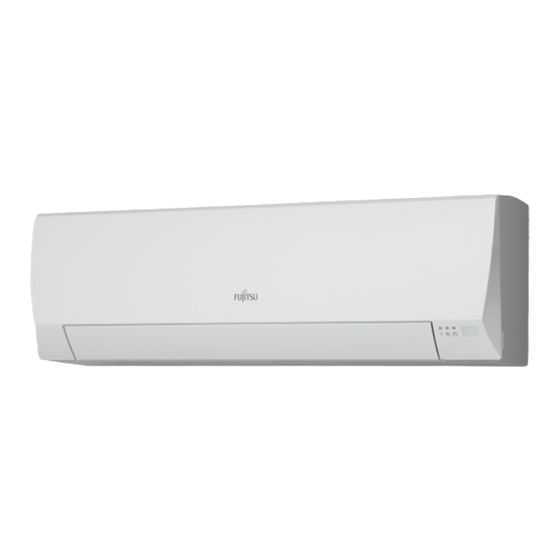AirStage AGYE007GCAH Installation Manual - Page 3
Browse online or download pdf Installation Manual for Air Conditioner AirStage AGYE007GCAH. AirStage AGYE007GCAH 15 pages. Indoor unit (floor type)
Also for AirStage AGYE007GCAH: Operating Manual (8 pages)

2.3. Accessories
For installation purposes, be sure to use the parts supplied by the manufacturer or other
prescribed parts.
The use of non-prescribed parts can cause serious accidents such as the unit falling,
water leakage, electric shock, or fire.
• The following installation parts are furnished. Use them as required.
• Keep the Installation Manual in a safe place and do not discard any other accessories
until the installation work has been completed.
Name and Shape
Q'ty
Operating
Manual
Installation
Manual
Operating
Manual
(CD-ROM)
Wall hook bracket
Tapping screw (M4 × 25 mm)
Cloth tape
Push mount cable tie
Air cleaning filter
2.4. Optional parts
Descrip-
Model
tion
UTY-XWZXZC For output function (Output terminal / CNB01)
For control input function (Apply voltage terminal /
UTY-XWZXZB
CNA01)
External
UTY-XWZXZD For control input function (Dry contact terminal / CNA02)
connect kit
For forced thermostat off function (Apply voltage terminal
UTY-XWZXZ7
/ CNA03)
For forced thermostat off function (Dry contact terminal
UTY-XWZXZE
/ CNA04)
WARNING
Application
1
(This book)
1
1
For indoor unit installation.
1
For wall hook bracket installation.
9
For indoor unit installation.
1
For transmission and remote controller
cable binding
1
For installation, refer to the "CLEANING
2
AND CARE" in the operating manual.
Application
3. INSTALLATION WORK
Correct initial installation location is important because it is difficult to move unit after it is
installed.
3.1. Selecting an installation location
Decide the mounting position together with the customer as follows.
Select installation locations that can properly support the weight of the indoor unit.
Install the units securely so that they do not topple or fall.
Do not install the indoor unit in the following areas:
• Area with high salt content, such as at the seaside. It will deteriorate metal parts, caus-
ing the parts to fail or the unit to leak water.
• Area filled with mineral oil or containing a large amount of splashed oil or steam, such
as a kitchen. It will deteriorate plastic parts, causing the parts to fail or the unit to leak
water.
• Area that generates substances that adversely affect the equipment, such as sulfuric
gas, chlorine gas, acid, or alkali. It will cause the copper pipes and brazed joints to
corrode, which can cause refrigerant leakage.
• Area that can cause combustible gas to leak, contains suspended carbon fibers or
flammable dust, or volatile inflammables such as paint thinner or gasoline. If gas leaks
and settles around the unit, it can cause a fire.
• Area where animals may urinate on the unit or ammonia may be generated.
Do not use the unit for special purposes, such as storing food, raising animals, growing
plants, or preserving precision devices or art objects.
It can degrade the quality of the preserved or stored objects.
Do not install where there is the danger of combustible gas leakage.
Do not install the unit near a source of heat, steam, or flammable gas.
Install the unit where drainage does not cause any trouble.
Install the indoor unit, power supply cable, transmission cable, and remote controller
cable at least 1 m away from a television or radio receivers. The purpose of this is to
prevent TV reception interference or radio noise. (Even if they are installed more than 1
m apart, you could still receive noise under some signal conditions.)
If children under 10 years old may approach the unit, take preventive measures so that
they cannot reach the unit.
Take precautions to prevent the unit from falling.
(1) Install the indoor unit on a place having a sufficient strength so that it withstands
against the weight of the indoor unit.
(2) The inlet and outlet ports should not be obstructed; the air should be able to blow all
over the room.
(3) Leave the space required to service the air conditioner.
(4) Install the unit where connection to the outdoor unit (or RB unit) is easy.
(5) Install the unit where the connection pipe can be easily installed.
(6) Install the unit where the drain pipe can be easily installed.
(7) Install the unit where noise and vibrations are not amplified.
(8) Take servicing, etc., into consideration and leave the spaces. Also install the unit
where the filter can be removed.
(9) Do not install the unit where it will be exposed to direct sunlight.
WARNING
CAUTION
En-2
